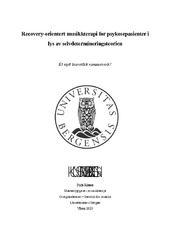| dc.contributor.author | Riisnes, Frida | |
| dc.date.accessioned | 2020-07-02T04:22:04Z | |
| dc.date.available | 2020-07-02T04:22:04Z | |
| dc.date.issued | 2020-07-02 | |
| dc.date.submitted | 2020-07-01T22:00:34Z | |
| dc.identifier.uri | https://hdl.handle.net/1956/23201 | |
| dc.description.abstract | Det siste tiåret har musikkterapi fått et stadig større fotfeste innen den norske psykiatrien, og særlig psykosefeltet. I Helsedirektoratets nasjonalfaglige retningslinjer for behandling av psykoselidelser anbefales også musikkterapi for denne pasientgruppen. Et konsept fra musikkterapilitteraturen som ofte benyttes i relasjon til den musikkterapeutiske behandlingen av psykosepasienter er recovery. Konseptet har fått en verdensomspennende påvirkning på helsevesenet som helhet, men bærer samtidig likheter til den veletablerte selvdetermineringsteorien (SDT) som også har blitt foreslått å kunne fungere som et teoretisk rammeverk for recovery. Med utgangspunkt i forfatterens egen nysgjerrighet for en ytterligere forståelse av hvordan den recovery-orienterte musikkterapien fremmer bedring hos den aktuelle pasientgruppen, undersøker denne studien om SDT kan fungere som et teoretisk rammeverk i en musikkterapikontekst. Ved å foreta en kritisk fortolkende syntese (CIS) av eksisterende litteratur, formuleres det først et syntesising argument. Videre diskuteres dette i lys av SDT tre universelle behov for autonomi, tilhørighet og kompetanse – samt dets potensiale for en økt forståelse av hvordan musikkterapi fremmer bedring, og tverrfaglig formidling av dette. | en_US |
| dc.description.abstract | Over the past decade, music therapy has gained an ever-increasing position in Norwegian psychiatry. In particular the field of psychosis. The National Directorate of Health's national guidelines for treatment of psychotic disorders also recommends music therapy for this patient group. A concept from the music therapy literature that is often used in relation to the music therapy treatment of patients with psychosis is recovery. The concept has had a worldwide impact on the health care system as a whole, but at the same time bears similarities to the well-established self-determination theory (SDT), which has also been proposed to serve as a theoretical framework for recovery. Based on the author's own curiosity for a further understanding of how recovery-oriented music therapy promotes improvement for the relevant patient group, this study investigates whether SDT can serve as a theoretical framework in a music therapy context. By conducting a critical interpretive synthesis (CIS) of existing literature, a synthesizing argument is first formulated. Furthermore, the arguments of the synthesis are discussed in light of the SDT three universal needs for autonomy, belonging and competence - as well as its potential for an increased understanding of how music therapy promotes improvement, and interdisciplinary dissemination. | en_US |
| dc.language.iso | nob | |
| dc.publisher | The University of Bergen | |
| dc.rights | Copyright the Author. All rights reserved | |
| dc.subject | psykose | |
| dc.subject | selvdetermineringsteorien | |
| dc.subject | Musikkterapi | |
| dc.subject | recovery | |
| dc.title | Recovery-orientert musikkterapi for psykosepasienter i lys av selvdetermineringsteorien Et nytt teoretisk rammeverk? | |
| dc.title.alternative | Recovery-oriented music therapy for patients with psychosis in light of the Self-determination theory. A new theoretical framework? | |
| dc.type | Master thesis | |
| dc.date.updated | 2020-07-01T22:00:34Z | |
| dc.rights.holder | Copyright the Author. All rights reserved | |
| dc.description.degree | Masteroppgave i musikkterapi | |
| dc.description.localcode | MUTP350 | |
| dc.description.localcode | MAHF-INMUT | |
| dc.description.localcode | MAHF-MUTP | |
| dc.subject.nus | 715136 | |
| fs.subjectcode | MUTP350 | |
| fs.unitcode | 18-30-0 | |
